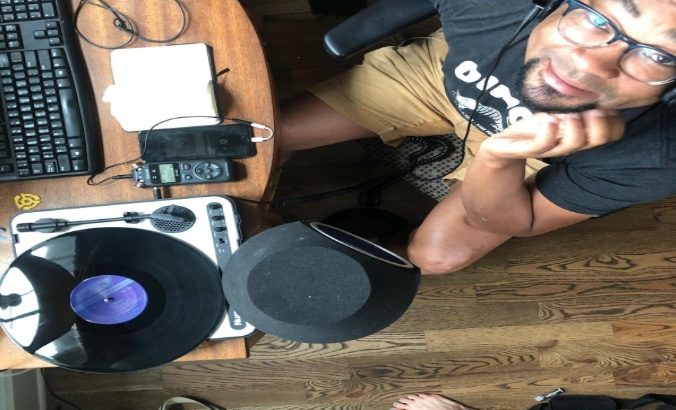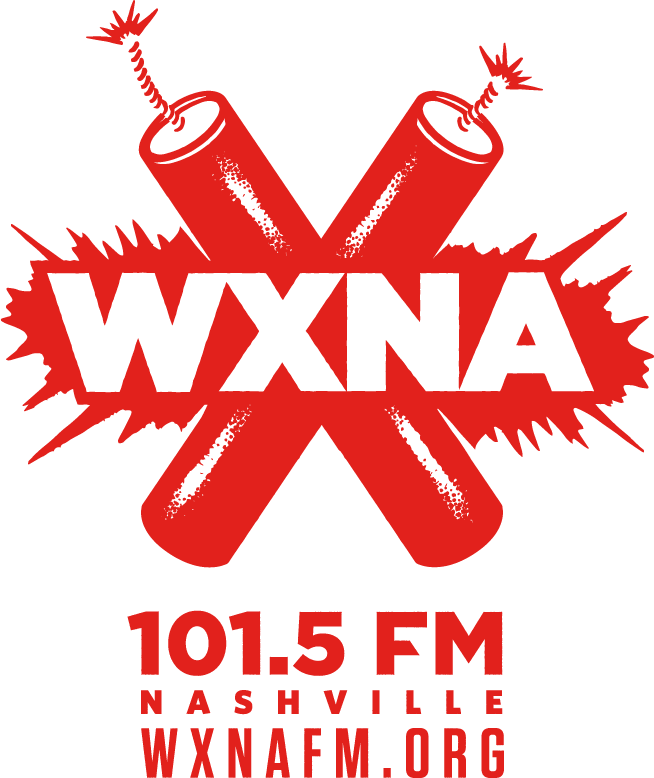In this time of COVID, WXNA has been keeping good music on the air with the help of some brave souls who are willing to come into the studio and even more braver souls who are recording brand new shows at home. We wanted to give you a glimpse of what goes into the pre-recording process for WNXA DJs. It’s a brand-new world that we are exploring, and everyone has their own take on it. Read below about what your favorite DJs and shows are doing to keep the X explosive.
Tag: Radio
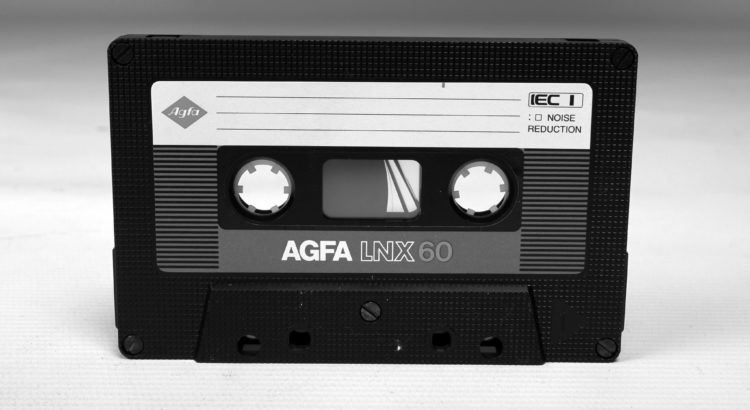
Shut Up and Play the Hiss: An Oral History of “The Magnetic Media Hour”
In the storied (fake) history of free-form radio across these United States, one show left arguably the biggest impression of them all. “The Magnetic Media Hour” was one of the first shows to push the medium in new and interesting directions. Hosted by J. D. Warkel, “The Magnetic Media Hour” was an avant-garde hour of the most unique recordings on the planet. Interestingly, those recordings also happened to be some of the most common. This is the story of how that show came to be, thrived and ultimately faded away, told by the people who where there.
J. D. Warkel, host: I remember the first first thing I played. It was a TDK-60. Found it in a box of old coins at an estate sale in Tupolo. To this day, I don’t think I’ve ever heard anything quite like it.
Allison Silverslaw, station manager, KOQK: J.D. was a pioneer. When he came to us and said he only wanted to play blank audio cassettes over the air, I initially called security and had him thrown out of the building. But he was persistent. After his third attempt, he threw a brick through my office window with a Maxell-120 tied to it and a note that read, “Just listen!” I’m glad that I did — he was right. The sound was incredible. Three months later, after he was released from county lock-up, I gave him a show.
Tim Gurt, warehouse manager, Electronics Bazaar: He was absolutely a regular. Always asking what kind of shipments were were getting in each week. And then every Friday he’d be at the front doors before the store opened. I’d meet him in the atrium and take him to the back room and we’d break down pallets together. In exchange for getting first dibs on all of the new cassettes, he would also help me stock the ink cartridges.
J.D. Warkel: When most people see a blank tape — at lease back in those days — they would see it as a way for them to record “other” music — songs off of the radio, their own LPs so they could listen to them in the car, mixes for that special someone in their life. But those people were all rubes and criminals. They didn’t realize what was being lost. The purity of the hiss, that’s what I was evangelizing.
Tammy T. Plop, listener KOQK: I was driving around one Saturday night testing out parking spaces — y’know, too wide, too narrow, is it angled? — anyway, I had the radio tuned to KOQK — I had my knob snap off a few weekends before, lost it in a parking lot (great lot, by the way, the striping was impeccable), so my radio was pretty much always locked in on KOQK. It’s a good station for parking, y’know? The variety of what they play really helps with the variety of parking spaces you find in most lots or public garages. Wait a minute, what was the question again?
Allison Silverslaw: I think it was after his third show when we started to get a lot of feedback from the community. A common refrain was, “I thought your signal went out, but I guess not” or “I don’t understand what is happening? I don’t hear anything but hiss.” People were really into it. “I wish this were music!” they’d say.
J.D. Warkel: I didn’t like the JVC tapes. I know some do, but they never did it for me. Look, I’m not going to criticize another person’s taste when it comes to hiss, but in my experience the only people that listen to JVCs are clowns — literal clowns.
Allison Silverslaw: At the time, our second most popular show was “Big Shoe Dance Party,” which was a two-hour show featuring clown and circus music. It was hosted by Mr. Sundrop, a prominent member of the local clowning community. One Thursday Mr. Sundrop started playing blank JVC tapes — I think he featured the A side of a 60-minute tape a friend had passed along. People really loved it. Of course, this didn’t sit well with J.D.
J.D. Warkel: Mr. Sundrop? I don’t want to talk about Mr. Sundrop.
Alan Vick (aka Mr. Sundrop), professional clown: Look, I just want to make people happy — which is harder and harder to do these days as a clown. I don’t know if you’ve read the papers, but clowns are really struggling. Everyone is afraid of us! I’m not saying we can blame J.D. entirely for that, but he wasn’t not not responsible, y’know? Wait, how many negatives is that? It was supposed to be two — but now I’m thinking it was three. Can we start over?
J.D. Warkel: All I’m saying is he ripped me off. I don’t want to talk about it. But he’s a thief and he ripped me off! Let’s change the subject. If I see Mr. Sundrop again, and I don’t care if he’s making a balloon poodle for some eight year-old, but I’m gonna take off that dumb red nose of his, and I’m gonna make him eat it. With his mouth. All of it.
Allison Silverslaw: I think we knew things were changing when J.D. started playing vinyl.
J.D. Warkel: A buddy of mine hooked me up with an unpressed 180-gram LP from a local record plant (actually, without all of the groves, it might even be 181 grams). Anyway, I wanted to broaden my horizons – thought the listeners would really appreciate it. Way more than that clown music. That’s for sure.
Allison Silverslaw: I’d never heard so many complaints. One woman came up from the parking lot screaming about her ears.
Tammy T. Plop: The sound was just horrible. There was nothing subtle about it. I was parallel parking at time — right outside the station. I couldn’t take it anymore. I just left the car running and went in to look for the station manager. My car was a solid 8 inches from the curb. I was so ashamed.
Allison Silverslaw: He locked the door to the studio so we couldn’t stop him. He played the entirety of the B-Side. When he replaced the turntable stylus for the second time, we decided to take drastic actions and pulled the station off the air. At the time KOQK had been broadcasting non-stop since 1949. It was a dark day.
J.D. Warkel: Do I wish I could do it over again? Yeah, I do. I regret playing the vinyl. I’m a magnetic tape guy. It’s in my blood. And I hated going back to county lockup. In hindsight, not all communication has to happen with a message taped to a brick.
Tim Gurt: When magnetic tape started to fade away, he stopped coming into the store. CD-Rs, that’s what we were stocking. I think he bought out the last of our Maxell stock, and then just sort of vanished. But I do remember seeing him one Saturday afternoon in the late 90s, standing in front of the shelves and quietly weeping. It was sad. But, if I’m gonna be honest with you, I’m a simple man. I prefer listening to recorded music. I never really understood the whole ‘hiss’ thing. It sounds “warmer” he would always say. What does that mean, warmer? Can I dance to it? Does it have a killer guitar solo? In the bridge does it change key? These are the questions that are important to me. Eh, what do I know.
“The Magnetic Media Hour” went off the air on August 14th, 1993. This November “Big Shoe Dance Party” will be celebrating it’s 30th year on the air.
Rick Pecoraro
WXNA Contributor
Photo credit: stuart.childs on Flickr
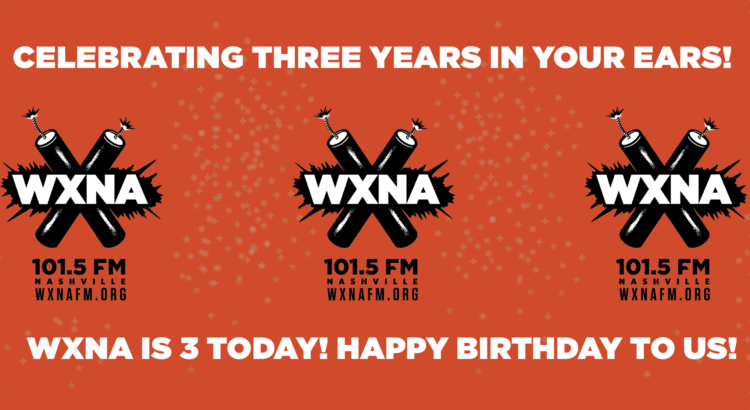
Freeform Love: WXNA Turns 3
My indoctrination into music nerd-dom came rather late in life. I spent my high school years as a science fiction/comic book/movie/comedy nerd. My primary access to new music was what I heard on mainstream Top 40 radio, most of which left me cold in the late 1970s. My only source for records was the Russellville, Kentucky, Big K (a local discount store chain that was devoured whole by Walmart in 1981) where I scoured the racks for movie soundtracks, comedy LPs, and Beatles records, the one musical group I was truly passionate about during my high school days.
Growing up in the boondocks of Western Kentucky meant I had no access to a local record store to discover artists I’d never heard before, and I lacked a music “mentor” to say, “You’ve never heard fill-in-the-blank? Here, listen to this!” Occasionally I might see an interesting act on TV like Blondie or Devo, but the musical infrastructure to nurture a budding fascination simply did not exist in my world.
My first year of college at Western Kentucky University in Bowling Green, Kentucky, changed my life more completely than I could ever imagine. Not only did I feel like I was free from the rural “prison” of my high school teenage years, but I suddenly found the perfect means to express my teenage angst and frustration – punk rock. My first few weeks of college led me to records by the Ramones, the Sex Pistols, the Clash, Elvis Costello (back when he was one REALLY pissed-off skinny geek), and more. But along with the punk rock, I was also discovering 1960s rock beyond the Beatles: glam, ’70s hard rock, classic early rock’n’roll, and more. Albums like London Calling, Jerry Lee Lewis Original Golden Hits, The Kinks Are the Village Green Preservation Society, and The Rise and Fall of Ziggy Stardust and the Spiders from Mars all arrived in my growing collection within weeks of each other.
The result was that I quickly developed very egalitarian tastes in music. For me, Otis Redding’s Dock of the Bay was just as much “new music” as X’s Under the Big Black Sun. At the same time, I became aware of just how boring and timid mainstream commercial radio was. Records like R.E.M’s Chronic Town knocked my socks off, but you sure didn’t hear it on the big radio stations.
“Someone should start a radio station that just plays great music, no matter when it came out or what style it is!” became one of my frequent rants. “It might not be the highest rated station in town,” I bellowed at passing clouds, “but there are enough people who would dig it if someone just had the balls to just do it!”
It would take me three decades to finally put my time and money where my rant was. Of course in the meantime, I’d discovered college radio, but even it often fell victim to the “format” infection, and its entanglement with university politics and dependency on a young, inexperienced and constantly rotating management team meant that even the best station could be decimated with one graduation ceremony or an arbitrary decision by an institutional bureaucrat.
Around the same time I secured a community-volunteer spot on Vanderbilt University’s WRVU in 1997, I also discovered WFMU and other like-minded freeform stations that were just beginning to extend their programming to the internet. A similar station was what Nashville truly needed — an independent, community-focused radio station, founded on a belief that good programming, no matter how eclectic, would find its audience.
The death of WRVU as a terrestrial broadcast station in the summer of 2011 was a tragedy for Nashville’s cultural scene, but it also presented an opportunity. That’s why I jumped at the chance when Heather Lose called me in the March 2012 to ask if I had any interest in starting an independent, listener-supported community radio station in Nashville. At our first meeting, I said we had to be totally freeform, every DJ programming their own show, and I was pleased and surprised to find that everyone else felt the same way.
Seven years after that first meeting, and three years since WXNA officially began broadcasting that vision of freeform, people-powered radio is not only still going strong but is growing. WXNA is a testament to both our volunteers and our listeners. It demonstrates that real human beings sharing their passion for music, the arts, and the human condition can inspire hope, bring real change to the world, and share our humanity in the moment, right here and now, along with proving that punk fury-powered rants sometimes turn out to be right.
Randy Fox
Randy’s Record Shop
Mondays, 7-9 a.m.
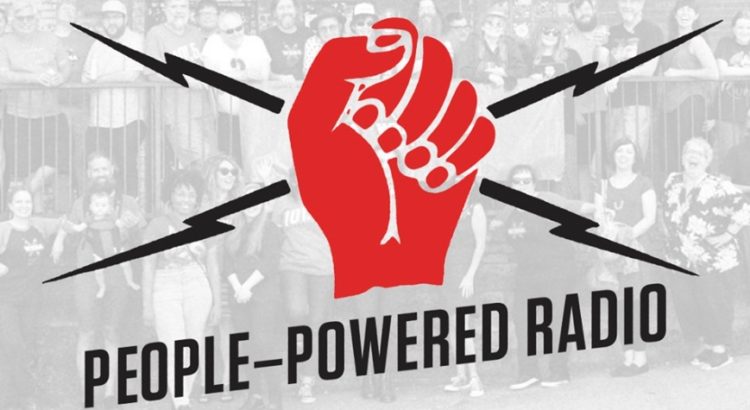
Let’s Hear It for People-Powered Radio!
When we brag that WXNA FM is people-powered radio, we mean it. Listener support makes possible our broadcasting in Nashville at 101.5 FM and online, with a wide array of freeform and speciality programming coming to you seven days a week. This Spring Pledge Drive (May 13-19, 2019), we thank you for expressing your love for WXNA by making a donation. Here’s what several of our volunteer DJs had to say about what people-powered radio means to them.
Leanne Merritt of “X-Posure”
People-powered radio, especially WXNA, is a positive example of a thriving symbiotic relationship. I love seeing how music connects us all and I realize every day just how small the world is as I meet people through music. I believe that music is a powerful connector, and that it creates community. I hope that the joy I get by sharing new sounds on my radio show is also experienced by the listener tuning in and by the artist who is getting their music played on the radio.
Plato Jenkins of “The Needle in the Groove”
WXNA gives me a reason to search out new (to me) music. It’s like spinning records in my living room, except I’m sharing with more than just my dog. 😜 And the other shows inspire me.
Laura Pochodylo of “Big Little Records” and “Runout Numbers”
For me, being part of a people-powered radio station is an exercise in putting my time, effort and money where my mouth is. If I want an alternative to corporate mass media, I had better help build and support it! Hosting two shows each week is a great excuse I can use to keep buying cool records, and I love that it expands my sonic horizons while building my confidence in my musical knowledge and on-air abilities. Being a part of WXNA feels like having an extended family all throughout Nashville.
Alexis Stevens of “Free Association”
WXNA reflects the eclectic tastes of the Nashville community (and beyond), and it belongs to the listeners who support it—that is people-powered radio. On a personal level, it fulfills a deep desire in me to share the music I love with others. I think all WXNA DJs feel that way and take the responsibility/privilege seriously. Long live freeform, people-powered radio! LONG LIVE WXNA!
Peter Rodman of “Peter Rodman Goes Off”
Music changed my life the minute WXNA went on the air. It changes my life every day listening to the station. I learn more about music now than I had learned in the 50 years prior to the launch of this station! It shows how much the station revitalizes this 67-year-old–we want to do that for everyone listening!
Chris Nochowicz of “The Future of Jazz”
When I found out that I have a listener in another country building their personal playlists off of what I play; when I have a listener tell me that what I played got them out of a tough point in their life; when I know I have sold music for artists because their listeners heard it on my show, I understand how important what I play is. All of a sudden I realized that what I play and say is important. I need to stay fresh and current and keep finding the struggling artist that doesn’t have the money to promote, but has some of the best music out there. I’ve been doing this for fifteen years and I could go on forever about why I do this. Better than a paid day at work. Oh, and then the large group of friends I met because of the ❌
Nashville Leslie of “Studio & Stage” and “The Soap Radio Hour”
People-powered radio means radio that still reflects free speech and real people playing music they’re passionate about!
Lauren Turner of “Shout, Sister, Shout!”
From the late-great “Seaship Auricle” to “Maiden Voyager”—this station has got the whole world’s music covered, as well as the music of the weird and wonderful people in your backyard, making your breakfast, and teaching your children! The magic of the everyday is alive and well on-air, and running on community support is totally a part of that!
Celia Gregory of “What Moves You”
When plotting a move to Nashville from my college town a decade ago, aiming to immerse myself in LIVE music, it never occurred to me I might have the opportunity to spin songs and talk to artists I love, sharing their art and perspectives with a wider audience via terrestrial radio. WXNA is a people-powered labor of love, and a dream come true for the volunteer DJs who lend their time and record collections. But we hear from listeners that this is THEIR radio home, too, and there’s room for all! Inclusive. Inspirational. Addictive. For those about to rock (tuned to 101.5 FM), we salute you.
Heather Lose, Founding President of WXNA and “Aging Hipster” Host
To me it’s all about connecting with the audience. Our world is a complicated, scary, amazing, beautiful, horrific place. Prepping each week’s show in response to what’s going on out there helps me process, and sharing these songs brings community together to celebrate, mourn, rage, or just enjoy an awesome Elvis Costello song on a pretty day. Because it’s happening live, we’re doing these things together, and anything that helps bring people together is very special and very needed.
Lauren Bufferd of “Different Every Time”
I came of age at a time when radio was the primary way I learned about new music or really any music, short of sharing with friends. I first heard Coltrane on a late night jazz show and had to pull over to the side of the road. I’d never heard anything so beautiful–I had to stop driving. Though nothing’s been quite as transcendent since, I have been exposed to lots of new music via radio. When I do my show, I am thinking of someone like me who has big ears and eclectic taste and is going to hear something new and beautiful and exciting on “Different Every Time” and fall in love, just the way I have, so many many times. Also, it’s a great excuse to buy more CDs.
Michael Buhl of “The Scatter Shot”
I suppose “people-powered radio” is about individual passions—certainly that of the DJs, who would do their show the same way regardless of whether they had one million listeners or no listeners at all, but also that of the listeners who get their individual tastes and interests catered to as well as being able to discover new ones.
Ashley Crownover of “Set Records to Stun” and “The Soap Radio Hour”
Freeform radio is magic brought to you by wizards who are secretly regular people just like you. The songs they play are spells that say, “You are not alone.” The power to cast these magic spells is created via a mystical process of ritual and belief that combines faith, science, and financial support in a big black cauldron of community. DJs stir the concoction at 33 1/3 RPM while cackling maniacally to themselves in a room full of alchemical equipment made possible by listener support. The result is a sparkling fresh batch of people-powered radio sent straight to your head and your heart every single day!
Ed Brinson of “Eighties/Schmeighties”
Being part of an organization that is dynamic, growing, and engaged with the community is a true privilege. And planning shows and presenting music beats paying for psychoanalysis!
Hound Dog Hoover of “Goin’ Down South”
To me, people-powered radio means that WXNA is bigger than the sum of its parts. Our individual shows might cater to a particular audience, but anyone that tunes it at any time will find some delightful surprises.
Drew Wilson of “Loud Love Show”
I love having the opportunity to play songs that a listener might not get a chance to hear anywhere else. For that one kid who hears a punk song on the radio late at night and starts learning three chords. To build a community and give an outlet to those that already exist. Music is both a release and a unifying bond. To hear songs that mean something to you, that would never get airplay on a commercial station, that can be life changing.
Randy Fox of “Randy’s Record Shop”
Radio is the sound of human voices singing, talking, and connecting with others. It’s one of the most powerful inventions ever created and can be, and should be, more than a means to make money and sell products. “People-powered radio” is real human beings sharing their passion for music, the arts, and the human condition—changing lives and inspiring visions of a world bigger and more diverse than one imagination can contain. It’s also the best means possible to inspire hope, move feet and shake booties, raise a fist in solidarity, rock your ass off, and share our humanity in the moment, right here and now.
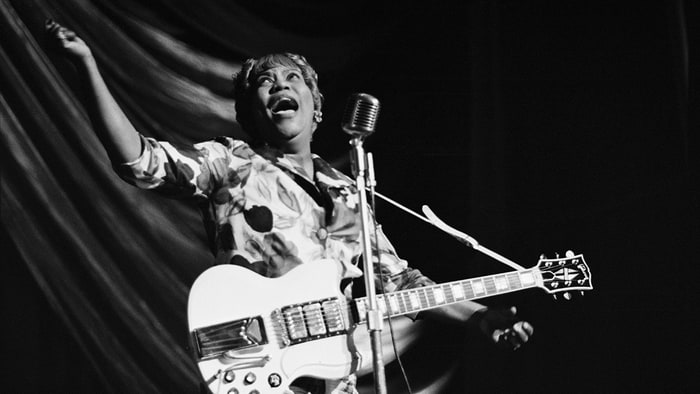
Shout, Sister Shout!
Sister Rosetta Tharpe is the reason I titled my radio show Shout, Sister Shout!. I have my pal Joey to thank, introducing me to her music years ago while working together at the since-defunct J&J’s Market & Cafe, where all of us baristas frequently played things not only as cafe music, but as our own form of conversation: “Have you heard this?! Listen to this one while you’re doing the dishes!” not unlike many other no-frills haunts in Nashville, I’m sure.
“Have you heard this?!” is something I’m postured to ask every Sunday from 1-2pm on WXNA FM, where I host the show named after Tharpe’s song Joey played for me that day. I delight in asking that question and hearing that question, being surrounded by fellow DJs and listeners who teem with that obsessive curiosity about where sounds come from and what they can mean to us.
Born Rosetta Nubin on a cotton plant in Arkansas,Tharpe came of age playing thunderous electric guitar in traveling gospel groups and married an evangelical pastor in the 1940’s. Her voice is both cloud and lightning bolt: chilling wisps of tenderness alit by hollers of fury. She would bring gospel tunes to the nightclub via her signature Gibson SG and record all sorts of songs that defy the clarity-grubbing confines of genre. She was at long last inducted into the Rock & Roll Hall of Fame just last year. Later in life, she became musical and life partners with another woman in a time when that was unspeakable—especially for a woman of color. Her voice continues to cross every kind of boundary.
* * *
When an opportunity arose to host an hour of programming on the community radio waves of Nashville, I thought about existing radio shows and attitudes around the sharing of music. I considered how I would love to have a show defying genre and celebrating the nuances of form as it shape-shifts throughout tradition and culture in our rapidly globalizing world– and did so experimentally, yet accessibly. I thought about what my experiences could bring that maybe others could not, and my female-ness became difficult to ignore.
I felt that sense of delight seeping into my thoughts and my record collection, seeking out women I hadn’t heard of or had previously passed by for whatever reason, mining record shops and deep corners of the internet. I listened for sounds to play in conversation with Tharpe’s, voices of women and non-binary folx who were (or are) complex and genre-defying, marginalized and silenced–people like Beverly Glenn-Copeland or Nashville’s own Jackie Shane. I also looked for records by women that are celebrated but maybe not played as often as their brothers on the radio, for whatever reason. The music I’ve been choosing is personally inspiring, musically exciting, and culturally relevant– and there is almost always a new sister waiting in whatever crate I choose to dig in.
Despite this excitement and sense of certainty, approaching Shout, Sister, Shout! during #metoo and a clamoring, confusing call-out culture was tough. I wanted to approach it with a spirit of thesis more than antithesis, with joyful revolution more than reactionary rebellion. I didn’t want the show to feel exclusive to anyone, men included. The intention was to center the show around the sounds & stories of women, but trace their influences to all kinds of human experiences. It wasn’t necessarily designed to be explicitly radical, but if I’m honest– the show is radical simply by existing in a man’s world.
Playing majority women and nonbinary artists for an hour on the radio is noticeable, where playing all male voices for an hour is just– not. The airwaves tend to reflect the status quo rippling throughout everything else– in festival lineups, media coverage, and opportunities to make music without experiencing harassment. Recently a fellow DJ at WXNA (Hey, Heather!) brought to the community’s attention the sexist attitudes of a self-described commercial radio “consultant” who argued that if women made up 50% or more of programming on the radio, people would start to lose interest and touch the dial. He also added that in his astute opinion, female DJs are great to have for their “mom factor”, another gross condescension that masks as… I don’t know, being a mama’s boy?
* * *
There are endless complexities and nuances to hold in imperfect hands when we speak of gender, sexuality, and art. There are ever-evolving approaches, even in Nashville alone, on how to make safe space for women and nonbinary folx in music specifically. These are exciting times! I am in no way an expert or an authority on inclusivity, and I am not offering my records prostrate at the virtue-signaling-altar of the Goddess of the Politically Correct, who isn’t a substantial entity after all! However, I do think these communities (my communities) need representation– and that representation is more than a buzzword that lands corporate sponsorships and approval from the right kinds of people.
I think representation, like I saw articulated so well by NPR’s Jess Skolnik recently, needs to be paired with revolution. It’s not as simple as playing Joni in equal parts to Dylan or inserting Betty Davis into every conversation about Miles. Maybe it’s noticing the ever-spinning web between all of these artists, and when women are spun with duller thread, inspecting it a little closer and with tenderness. Keeping in mind that history has not been kind to her threads, that they may need some repair and restoration; and that they are not to be objectified on a pedestal of exclusivity, but rather recognized as part of the complex web of human musical history. Being intentional about the voices of women is difficult, painstaking work. It’s delicate and powerful, like I’d imagine adjusting the gears of a clock might be.
* * *
Let’s use The Rolling Stones as an example here. I haven’t played The Stones on my show. I don’t need to expound on this, obviously, something like “Brown Sugar” is not a counterpart to the sounds and stories of black women, not to mention it being overplayed and lyrically offensive. And yet, I don’t think I should “cancel” The Rolling Stones or burn every copy of Sticky Fingers as a listener of American music. But oh boy, do I listen to it with a critical ear, and think about what they continue to mean to our zeitgeist while tapping my toe. Here’s a thought– maybe I would play “Gimme Shelter” and discuss oft-overlooked, dynamite-vocalist Merry Clayton, how her name was misspelled as “Mary” on some of their releases, and play another one of her recordings in the same set. And hell, I’d throw in Liz Phair’s Exile in Guyville next to that too, and the whole show could be a self-referencing historical conundrum, and it would sound dynamic and great. As a DJ, I think it’s my responsibility to the community not to censor but to curate, and to play the voices that are less likely to be heard in elevated spaces such as these. Maybe it’s also our responsibility to explore how those voices can respond and add to the existing conversation. Isn’t recognizing the humanity in someone or something you don’t relate to the most radical thing we can do in a world of ever-dividing divisions?
* * *
In Nashville specifically, conversations around music can tend to feel pretentious and stilted. It is sometimes intimidating to do live radio for a city of musicians and critics, to know that my transitions may likely be analyzed, to know that as I struggle to pronounce someone’s name correctly, there is a listener out there in the void– driving their Volvo down Gallatin and cackling at my best. In this cultural moment, specifically in Nashville, I think we need to be able to fumble in front of one another. We need to dig for what delights us and unabashedly dust it off and spin it for our neighbors.
Looking into past generations and histories for the show has been such an enticing and inexhaustible adventure, but I think the most fulfilling points have been connecting them to people and music that are active now. The most meaningful moments of the show thus far have been the live interviews and in-studio sessions featuring women in Nashville who are doing really cool, important shit: Meg Pharr (of riot grrrl punk band Depression Breakfast), Sean Della Croce (singer-songwriter and co-founder of a print publication called Broadside), Ziona Riley (singer-songwriter & bassist for local band Heinous Orca), Kate Haldrup (local drummer and audio engineer), Eve Maret (synth wizard and Hyasynth House co-founder), Dream Chambers (electro-pop musician and other Hyasynth House co-founder), Wu Fei and Celine Thackston of chatterbird, and Peggy Snow (matriarch of the decades-running local experimental folk band The Cherry Blossoms and virtuosic painter of Nashville’s condemned buildings). Each of these women has brought wildly different playlists and perspectives into Martha’s Chicken Shack. Having them with me in that space feels electric and energizes me to ask more questions, to seek out more women, and ultimately to turn people onto more beautiful, meaningful shit.
In these moments when someone else is sharing from behind their particular lens of experience, I feel like I am getting to create the kind of space I intended to make on the show and that I long for more of in the world. I experience this as a listener, too– It makes me feel like the ever-spinning, ephemeral web of musical history is being held to new light, refracting incessantly for whoever chooses to turn the dial and tune in.
DJ LT
Shout, Sister, Shout!
Sundays, 1 p.m.-2 p.m.
